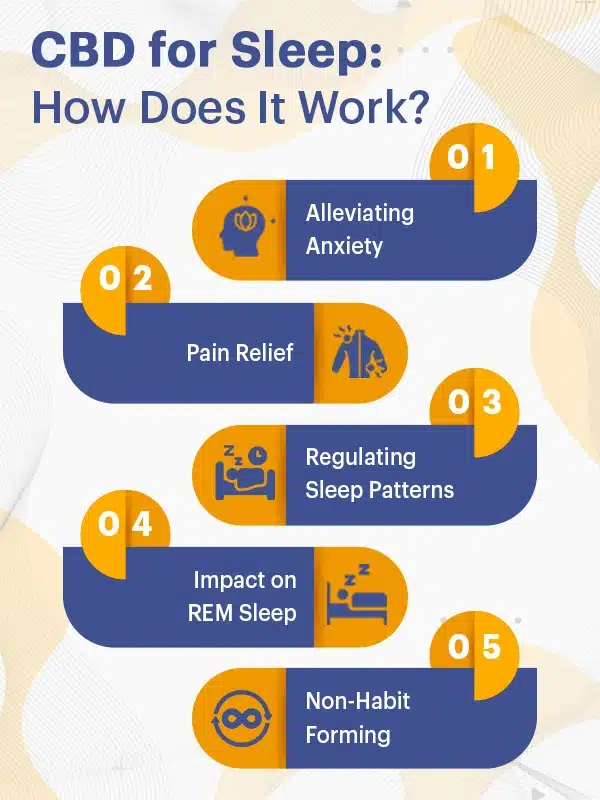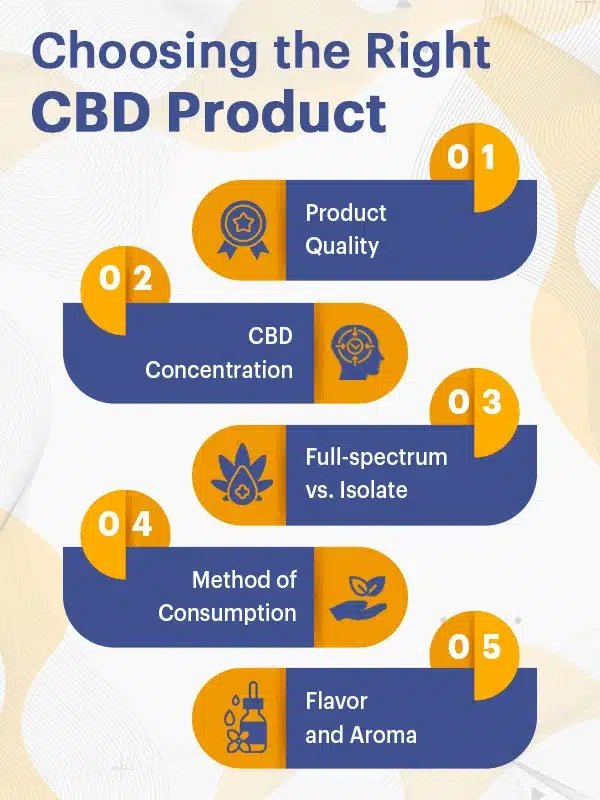
Quality sleep is fundamental to our health and well-being, influencing everything from mental sharpness to physical vitality. Yet, in today’s fast-paced world, many find a good night’s rest elusive, battling issues like insomnia and disrupted sleep patterns. Amidst various remedies, Cannabidiol (CBD), a naturally occurring compound in the cannabis plant, emerges as a beacon of hope. This article will explore how CBD, celebrated for its therapeutic properties, could be a key to unlocking the door to improved sleep quality. We will delve into its mechanisms, benefits, and the variety of available products, shedding light on how this natural compound can support those who struggle to rest in the quiet of the night.
Understanding CBD and Sleep
CBD’s interaction with the body’s endocannabinoid system offers a potential natural solution to sleep issues. By influencing key factors like mood and pain, which are often underlying causes of sleep disturbances, CBD has emerged as a popular alternative to traditional sleep aids. This section delves deeper into the nuances of how CBD works for sleep, supported by ongoing research and its growing popularity as a safe and natural remedy.
What is CBD?
CBD, short for Cannabidiol, is a remarkable compound extracted from cannabis plants, standing out in the realm of natural therapeutics. Unlike its counterpart THC (Tetrahydrocannabinol), CBD is non-psychoactive, meaning it doesn’t induce the “high” commonly associated with cannabis. It is one of over a hundred cannabinoids present in cannabis, each with unique properties. CBD has gained attention for its potential health benefits, including anti-inflammatory, analgesic, and anxiety-reducing effects, making it a subject of interest in various medical research and wellness communities. It’s used in various products, from oils and edibles to topical creams, offering versatile options for those seeking its benefits.
CBD vs. THC
CBD and THC are both cannabinoids found in the cannabis plant, but they have distinctly different effects on the body. THC, or Tetrahydrocannabinol, is the compound known for causing the psychoactive effects or the “high” associated with marijuana use. CBD, on the other hand, does not produce these intoxicating effects. Instead, it is lauded for its therapeutic benefits, such as reducing anxiety and pain without mind-altering experiences. This key difference makes CBD a preferred choice for those seeking the health benefits of cannabis without the psychoactive side effects. Moreover, while THC is still subject to strict legal regulations in many regions, CBD is generally more widely accepted and available, partly due to its non-intoxicating nature.
CBD’s Role in Sleep

CBD’s role in promoting sleep involves interacting with the body’s endocannabinoid system (ECS), a complex network of receptors and neurotransmitters crucial in regulating various physiological processes, including sleep, mood, and pain. CBD influences the ECS to help maintain balance or homeostasis in the body. It may help regulate cortisol levels, a stress hormone significantly affecting sleep quality. CBD also appears to have properties that can reduce anxiety and pain, which are often underlying causes of sleep disturbances. By addressing these issues, CBD can aid in creating a more conducive environment for restful sleep, enhancing both the quality and duration of sleep.
Research on CBD and Sleep
Research into CBD’s impact on sleep is an evolving field. Several studies indicate that CBD may improve sleep quality by addressing underlying causes such as anxiety, stress, and pain, which can disrupt sleep. For instance, a 2019 study found that CBD could decrease anxiety levels and improve sleep in a majority of subjects. Moreover, research suggests CBD may influence REM sleep behavior disorder and reduce daytime sleepiness. Despite these promising findings, more comprehensive studies are needed to fully understand the relationship between CBD and sleep and establish standardized dosing and long-term effects.
CBD’s Popularity
CBD’s rise in popularity as a natural remedy for sleep issues is largely due to its perceived health benefits and its non-psychoactive nature. The widespread anecdotal reports of its effectiveness in improving sleep quality, reducing anxiety, and managing pain have bolstered its reputation. Furthermore, the increasing availability of CBD products in various forms, like oils, capsules, and edibles, has made it more accessible to a broad audience. This surge in popularity is also driven by growing research and a general shift towards natural and holistic wellness approaches.
Read More: The Science of Serenity: CBD for Stress and Anxiety Management
CBD for Sleep: How Does It Work?
Discover how CBD potentially enhances sleep through its unique interaction with the body’s systems, addressing issues like anxiety, pain, and sleep cycle regulation.

- Alleviating Anxiety: CBD is known for its calming effects, which can reduce anxiety that often hinders sleep. It interacts with serotonin receptors in the brain, which play a key role in mood regulation and can indirectly affect sleep quality.
- Pain Relief: CBD can remove a significant barrier to restful sleep by easing pain. Its anti-inflammatory properties may help alleviate chronic pain conditions that disrupt sleep, offering a gentler alternative to traditional pain medications.
- Regulating Sleep Patterns: CBD may help regulate sleep cycles, promoting a more consistent sleep pattern. This could be particularly beneficial for individuals with irregular sleep schedules, such as shift workers or those with jet lag.
- Impact on REM Sleep: CBD might reduce REM sleep disturbances, which can benefit those with conditions like PTSD. This could lead to more restorative sleep and less frequent nightmares or sleep disruptions.
- Non-Habit Forming: Unlike some sleep aids, CBD is not associated with dependency risks. This makes it a potentially safer option for long-term use, especially for those concerned about addiction or adverse side effects from traditional sleep medications.
Types of CBD Products for Sleep
Explore the diverse range of CBD products tailored for sleep, including oils, gummies, capsules, topicals, and edibles, each offering distinct advantages and experiences.

- CBD Oils: High bioavailability makes oils like “SLEEP AID CBD 1000MG – Night” effective. They can be used sublingually for faster absorption, providing quicker results for those seeking immediate relief from sleeplessness.
- CBD Gummies: A palatable option that releases CBD gradually. These are ideal for those who prefer a more enjoyable and discreet method of intake, with the added benefit of a controlled, consistent dosage.
- CBD Capsules: Convenient and offer precise dosing. Capsules are suitable for those who require consistent CBD intake and are looking for an easy-to-use option without taste considerations.
- Topical Applications: CBD creams and balms can be applied directly to areas of discomfort. These are excellent for targeted relief, such as muscular or joint pain that might impede sleep.
- CBD Edibles: various edible forms, from chocolates to beverages, offer more enjoyable ways to consume CBD. They cater to a range of preferences and can be easily incorporated into evening routines, making the process of taking CBD more appealing.
Choosing the Right CBD Product
Learn the key factors to consider when selecting a CBD product for sleep, from product quality and concentration to consumption method and personal preferences.

- Product Quality: Opt for high-quality, third-party-tested CBD products. Ensuring the product has been independently tested guarantees purity and potency, reducing the risk of contaminants.
- CBD Concentration: Higher concentrations may be more beneficial for sleep. It’s important to find a strength that suits your specific needs, and starting with a lower dose and gradually increasing it can help determine the most effective concentration for you.
- Full-spectrum vs. Isolate: Full-spectrum products contain additional cannabinoids that may enhance the sleep-inducing effects. They also include other beneficial compounds like terpenes and flavonoids, which might contribute to the entourage effect.
- Method of Consumption: Whether oil, capsule, or edible, the method should suit your lifestyle. The choice depends on personal preference, the desired speed of onset, and convenience in your daily routine.
- Flavour and Aroma: Some prefer flavourless options, while others might enjoy flavoured varieties. Flavour and aroma can enhance the overall experience, especially for those sensitive to CBD products’ natural taste.
Safety and Side Effects
Understand the importance of starting with low doses, monitoring bodily reactions, recognizing potential side effects, consulting healthcare professionals, and being aware of the legal status of CBD in your region.
- Start with Low Doses: Begin with a small dose and adjust as needed. This cautious approach helps you understand how your body reacts to CBD and minimizes the risk of side effects.
- Monitor Reactions: Be aware of how your body responds to CBD. Keeping track of any changes can help determine the right dosage and identify any adverse reactions.
- Potential Side Effects: Though rare, some may experience dry mouth or drowsiness. Being aware of these possible effects can help in managing and mitigating them.
- Consulting Healthcare Providers: Always consult a healthcare professional, especially if taking other medications. This ensures that CBD does not interact negatively with existing treatments.
- Regulation and Legality: Be aware of the legal status of CBD in your area. Laws vary significantly by region and can impact the availability and types of products permissible.
Conclusion
CBD is rapidly gaining recognition as a natural and effective solution for enhancing sleep quality. Its unique interaction with the body’s endocannabinoid system offers a promising alternative to traditional sleep aids, with the potential to alleviate issues like insomnia and nightly restlessness. By comprehending its myriad benefits, exploring the different product types, and adhering to guidelines for safe usage, individuals can effectively harness the potential of CBD. This could be a transformative step towards consistently restful nights, contributing significantly to overall health and wellness. As we continue to understand and embrace the therapeutic capabilities of CBD, it stands as a beacon of hope for millions seeking a natural path to sound sleep and improved life quality.



